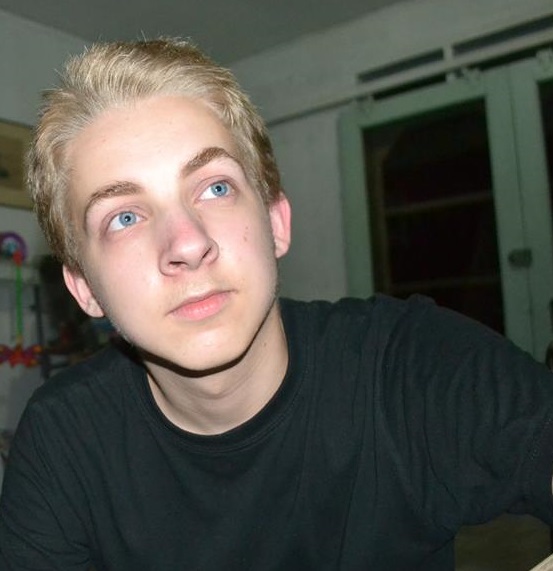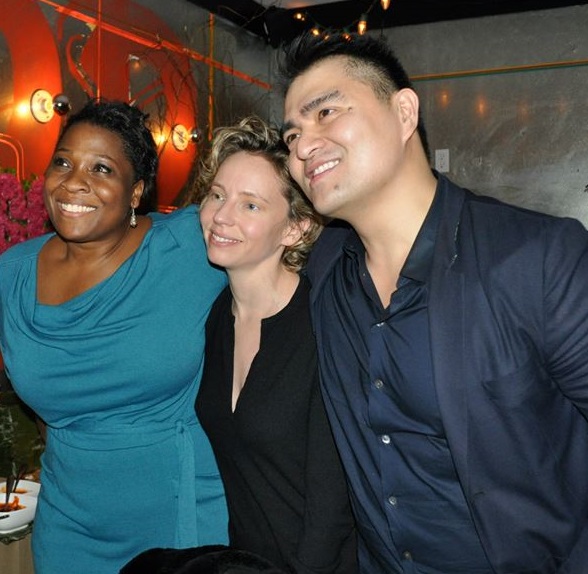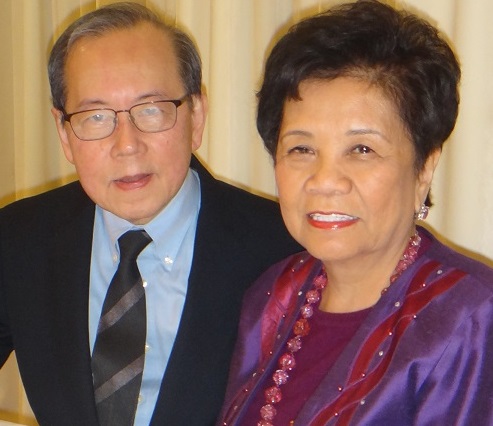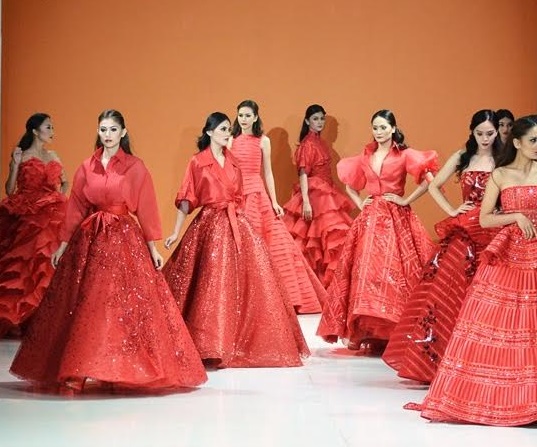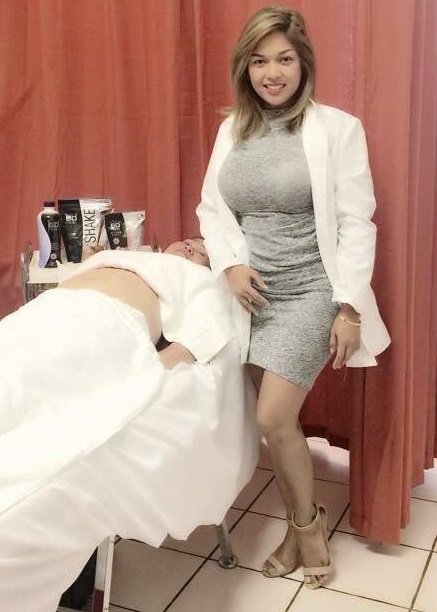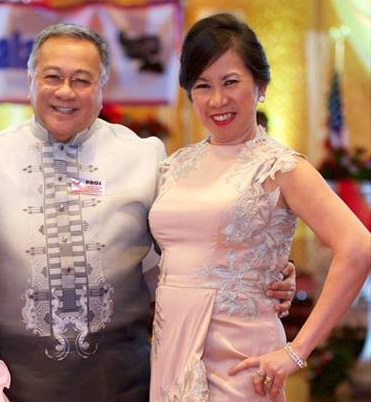FALA-NY Pres. Connie Montoya: ‘FilAm lawyers talented, bold, with healthy egos’
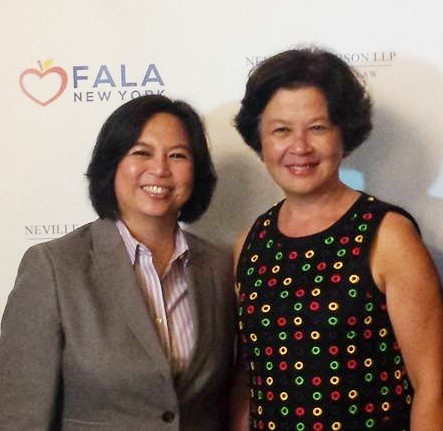
With Federal Judge Lorna Schofield, who administered the oath to incoming FALA-NY officers during the July 20 induction at the New York City Bar Association’s landmark building. Photos by Alex Lee
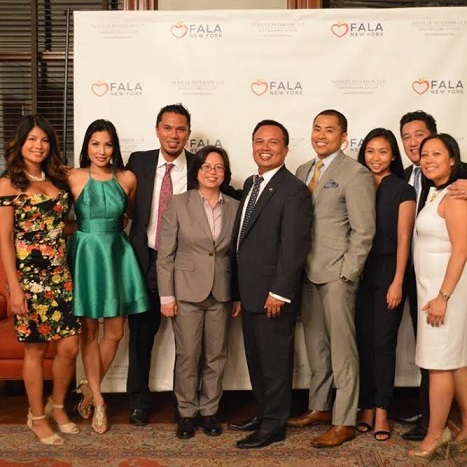
FALA-NY officers, from left: Amanda Bernardo, Anna Mercado Clark, Vince Roldan, Connie Montoya, Rio Guerrero, Rodrigo Tordecilla, Jenny Pelaez, Noel Vales and Elaine Calderon.
“You’re a woman, you’re not white, you’ll get into debt.”
Concepcion ‘Connie’ Montoya heard her father’s words, listened to his arguments, and in the end went the other way: She flung herself obstinately into law school.
Today, she is a partner at a national law firm Hinshaw & Culbertson LLP, and the president of the Filipino American Lawyers Association in New York or FALA-NY. She couldn’t be more fulfilled.
“I took law at age 30,” said Connie when interviewed by The FilAm. “My dad, who is a corporate litigator in the Philippines, did not want me to be a lawyer in the U.S., protective as he is. I usually do the opposite of everything I’m told not to do.”
In 2000, she graduated from the Brooklyn Law School and was thrust immediately into public service as a corporation counsel for the City of New York. She handled federal litigation, defending police officers, correction officers, and city employees being sued for civil rights violations, a role that is now in the news in light of recent cases of police abuses.
“That’s where I got my training and experience. It was like trial by fire. It taught me everything I know,” she said.
She left government after five years and joined the private firm Hinshaw, where she practices consumer class action defense and employment litigation. It was the right time, she said; she was seeking “other experience to broaden and deepen my career.”
At Hinshaw, ranked among the “top 100 firms for minority attorneys,” she is a member of the Diversity Committee.
“I came of age as a lawyer when diversity was being embraced both in Corporate America and in law practice. In my firm, diversity mattered and so it helped me,” she said.
Talented, with healthy egos
Three years ago, Connie and nine other lawyers, who met monthly for dinners at rotating Filipino restaurants, gathered at a conference room to formally organize what is now the Filipino American Lawyers Association of New York. The members cover a wide range of professionals in private practice and in government.
“We are judges, educators, government employees and officials, corporate attorneys, in-house counsel, law firm partners, solo practitioners, trial lawyers, and international attorneys,” said Connie in a speech during the group’s induction of officers held at the New York City Bar Association’s landmark building, where it hosted a Filipino American bar organization for the first time in its 146-year history. Federal Judge Lorna Schofield, who is the first Filipina American in the history of the United States to serve as an Article III judge, administered the oath-taking.
“It’s time that the FilAm community know who their lawyers are,” she declared. With that, she vowed that FALA-NY members will “bring our knowledge, our skills, our experience” to the community.
“Not just regarding immigration issues but also issues involving employment, health care, family law, elder law, governmental benefits and programs, and many other issues faced by the second largest Asian community group in the United States — that’s us, the Filipino Americans,” she said further.
Connie brushed aside the notion that non-Filipino Americans are better lawyers, perceived by some to argue with vigor and pugnaciousness and who are not easily rattled. At the same time, she recognizes how some FilAm lawyers “tend to shy away from the limelight,” making themselves invisible even within their own community.
“Now is not the time for us to stay behind the limelight and behind the shadows. We need to change that perception,” she told The FilAm. “FilAms have lots of needs, and as we grow in number our needs grow as well.”
She stressed how FilAm lawyers are talented people, who need to articulate who they are and what they stand for, which is “to be of service to their community.”
Members of FALA-NY are mostly U.S.-born or emigrated at a young age and completed their education in the U.S. Many of them have been practicing for at least five years. Connie came to the U.S. with her family at age 14.
They are among the best in their field, said Connie, the founding members an equally impressive bunch: immigration attorney Rio Guerrero of Guerrero & Yee LLP; senior corporate real estate attorney Noel Vales of the venerable Pillsbury Winthrop Shaw Pittman LLP; corporate bankruptcy attorney Vince Roldan, a partner at Ballon Stoll Bader & Nadler PC; former Assistant District Attorney Anna Mercado Clark, who is now practicing business and commercial litigation at Phillips Lytle LLP; Patricia Astorga, who is now a federal prosecutor as an Assistant United States Attorney; Melissa Lee Mazzitelli, who was formerly an Associate Attorney with the Mental Hygiene Legal Service for the Second Judicial Department of New York State; Annette Almazan, who is now a Special Assistant to the New York State Gaming Inspector General; and corporate litigator William Panlilio, who is now in Singapore and working for the Global Transactions Practice of the international law firm King & Spalding.
“We want to tell the community that if they are looking for a lawyer who can set up a business for you, we have that. Do you need help with a venture capitalist project, need a white-collar defense attorney, a divorce lawyer, we have that,” she said.
She concluded: “We’re all lawyers. We have healthy egos. Kailangan ka maging matapang, you need to be bold, confident, mapusok, to be effective as a litigator.”
But what binds FALA-NY together is more than shared profession. Bottomline, she added: “We’re united by culture, by heritage and by our common commitment to the Filipino American community.”
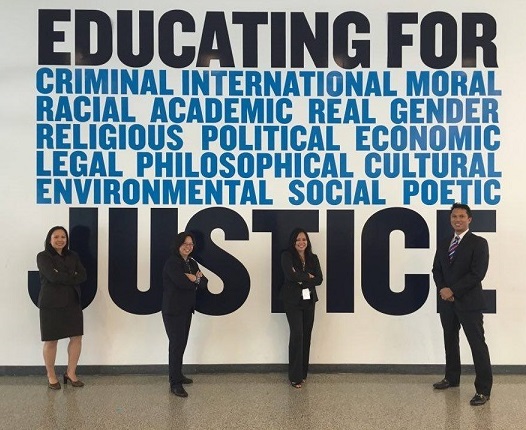
With Elaine Calderon, Jhanice Domingo, and Vince Roldan at the Filipino American National Historical Society conference where FALA-NY presented a trial reenactment of the Wards Cove civil rights case. The case against Wards Cove Packing Company, which reached the Supreme Court in 1989, was one of the three class action lawsuits led by Filipino activists in the 1970s against the poor working conditions faced by Filipinos in the salmon canning industry in Alaska.

